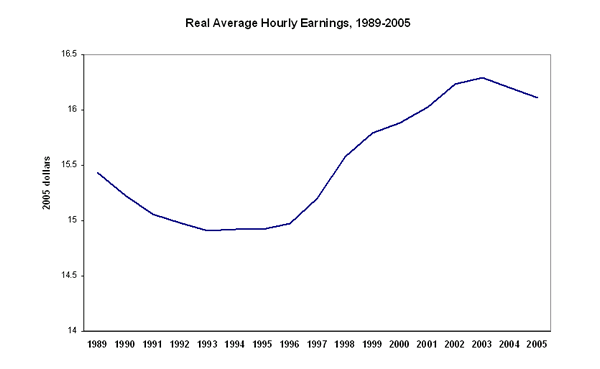Mean income increased for households, but how much of that was due to having more than one person in the workforce vs. seeing real wages increase?
Real wages have not gone up, they have hovered at $300/wk for the last 40 years according to the BLS.
http://www.workinglife.org/wiki/Wages+and+Benefits:+Real+Wages+(1964-2004)
This chart from EPI shows a raise in real hourly wages of $0.50 ($15.50 up to $16/hr) from 1989-2005.
So inflation adjusted hourly wages have stagnated for decades.
Also, I do feel the middle class is being squeezed. With various costs of living like education, health care or real estate growing far faster than wages while regressive taxes go up people are being asked to pay for more expensive goods and services with a lower net income.
I don’t know what larger a percentage of gross income goes to taxes for middle class families compared to 30 years ago, but as a guess I’d say 5% or so (meaning the tax rate may be 30% vs 25% a few decades ago, but that is a guess).
http://www.taxpolicycenter.org/taxtopics/images/ptax2_2.jpg
An employee’s half of payroll taxes is about 7.65% today, up from maybe 5.8% back around 1979. Plus sales taxes, property taxes, sin taxes, fuel taxes, etc have also gone up. So 5% is a rough estimate of how much more gross income goes to regressive taxes.
Add into that the disappearance of pensions, and people are being told to save 6% of gross income in 401ks for retirement. So not only have regressive taxes gone up but eliminating pensions has required middle class people to fund retirement more out of personal income.
Plus for companies that still offer health care the costs of deductibles have gone up.
All in all, the middle class is being squeezed. Wages are stagnating (unless you have 2 people in a household working) and net income is down due to higher retirement savings demands (due to a lack of pensions) and more regressive taxes. And people have to use that lower net income to pay for more expensive health care, education, child care and real estate. Student loans can last for years.
We save money in other areas though. A person in 2009 can use the internet to find a decent used car with good reliability for $5000 whereas 20 years ago a person had to pick whatever car was in the local paper. Information, comparison shopping, higher productivity and higher quality mean certain consumer goods are cheaper. So I think that mitigates some of the damage.
I don’t know if its possible to reverse this trend. Krugman says this is a political thing, not an economic issue. He claims no other OECD nation is seeing this kind of squeeze (he also claims no other OECD nation saw a rise in movement conservatism like the US).
I realize higher wages and better pensions would put us at a competitive disadvantage to foreign nations. But something has to change with this setup.
